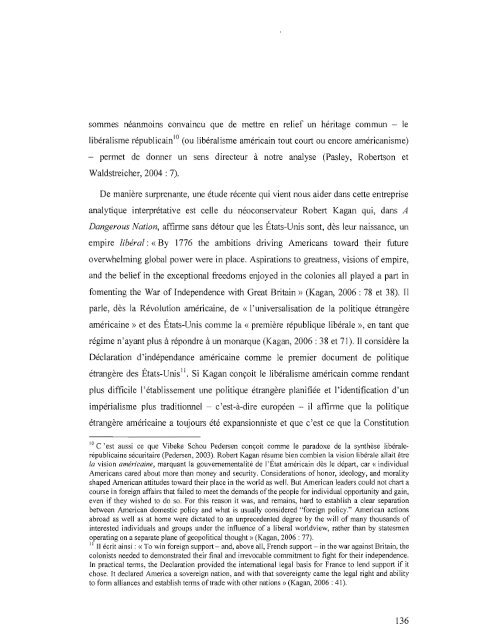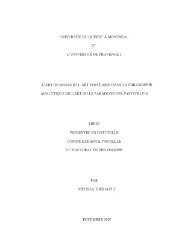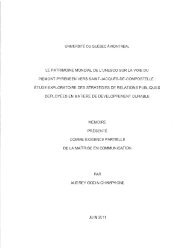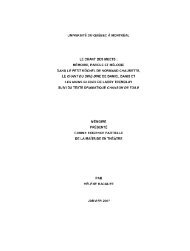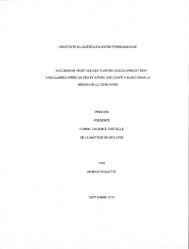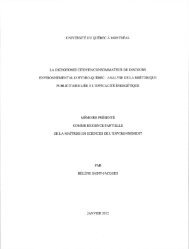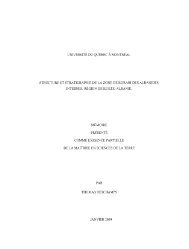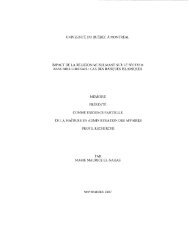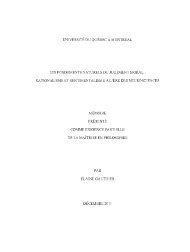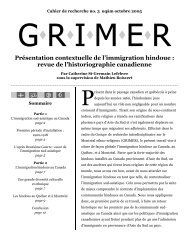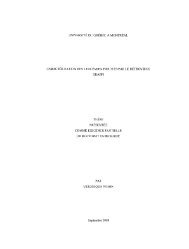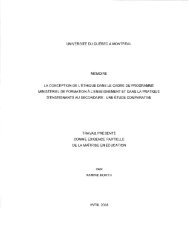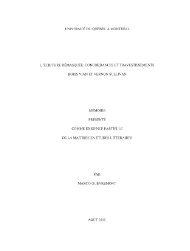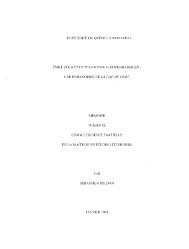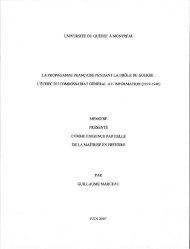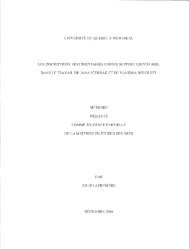- Page 1 and 2:
UNIVERSITÉ DU QUÉBEC À MONTRÉAL
- Page 3 and 4:
REMERCIEMENTS L'écriture de cette
- Page 5 and 6:
Katia Gagné, Sébastien Bmthe, Jea
- Page 7 and 8:
AVANT-PROPOS L'écriture d'une thè
- Page 9 and 10:
viii 5.1.2 La généalogie 53 5.2 L
- Page 11 and 12:
1.3 La Guerre contre la terreur com
- Page 13 and 14:
2. Le Nomos de la TelTe dans la Gue
- Page 15 and 16:
LISTE DES ACRONYMES ET DES ABBRÉVI
- Page 17 and 18:
INTRODUCTION La sécurité national
- Page 19 and 20:
de la stratégie militaire, c'est-
- Page 21 and 22:
2001 sur le choix d'une nouvelle do
- Page 23 and 24:
l'Espace et la préparation à la g
- Page 25 and 26:
centraux du Defense Planning Guidan
- Page 27 and 28:
Weldes, 1999). Les détenteurs du p
- Page 29 and 30:
la « défense» à la « sécurit
- Page 31:
l'emploi de régime gouvernemental
- Page 34 and 35:
au lendemain de la Seconde Guerre m
- Page 36 and 37:
institutionnelle: elle est dans les
- Page 38 and 39:
sur la théorisation du processus d
- Page 40 and 41:
Si le concept de «géopolitique»
- Page 42:
« intellectuels de la défense »2
- Page 45 and 46:
and Others, in terms of cartographi
- Page 47 and 48:
dites comme étant intérieures alo
- Page 49 and 50:
civilization, the fear of cultural
- Page 51 and 52:
de façon accélérée le processus
- Page 53:
libérale sécuritaire; c'est « a
- Page 56 and 57:
affronter l'exception: Réflexions
- Page 58 and 59:
global libéral américain établi
- Page 60 and 61:
interaction dialectique: elle le pr
- Page 62 and 63:
4.7 Une géopolitique critique de l
- Page 64 and 65:
facie plausibility compared to othe
- Page 66:
compétiteur stratégique. La même
- Page 69 and 70:
eader's interpretation of a text is
- Page 71 and 72:
productions de think tanks, des dis
- Page 73 and 74:
Presses universitaires de l'armée
- Page 75 and 76:
einforce or contest each other» (H
- Page 77 and 78:
problématique principale où les
- Page 79 and 80:
froide comme «nouvelle frontière
- Page 81 and 82:
CHAPITRE 1 LE MOMENT SCHMITTIEN AM
- Page 83 and 84:
en marge des approches traditionnel
- Page 85 and 86:
l'objectif de faire tomber les barr
- Page 88 and 89:
d'Alexander Wendt, surtout quand à
- Page 90 and 91:
threatens to make International Rel
- Page 92 and 93:
poststructural approaches need to b
- Page 94 and 95:
of the world and asks how that orde
- Page 96 and 97:
Cela implique, en outre, de repense
- Page 98 and 99:
Pour Michel Foucault, 1'« episteme
- Page 100 and 101:
Wohlforth 17, pour ne nommer que ce
- Page 102 and 103: ne doivent être employées qu'en d
- Page 104 and 105: national security state that was sh
- Page 106 and 107: les critiques intérieures contre l
- Page 108 and 109: aison de la perforrnativité du lan
- Page 111 and 112: praticiens politiques autant que de
- Page 113 and 114: chercheurs œuvrant dans des think
- Page 115 and 116: spatiale américaine. Cela nous emp
- Page 117 and 118: Les attaques terroristes sur le sol
- Page 119 and 120: usait de la force pour conquérir u
- Page 121 and 122: forger des opinions dans des émiss
- Page 123 and 124: mams de ceux qui les désignent com
- Page 125 and 126: The militarization of inner space t
- Page 127 and 128: détention sous le couvert de la s
- Page 129 and 130: de la vIe politique américaine (Sh
- Page 131 and 132: Dire et écrire la sécurité n'est
- Page 133 and 134: partie de la géostratégie dans la
- Page 135 and 136: liberté, de la démocratie et de l
- Page 137 and 138: les dirigeants dans celle-ci en rap
- Page 139 and 140: 1. L'Amérique comme lieu - et comm
- Page 141 and 142: américains se succèdent et change
- Page 143 and 144: puritain Jolm Winthrop en 1630, dep
- Page 145 and 146: eprésente le mythe fondateur par e
- Page 147 and 148: de recherche et de croire que ce de
- Page 149 and 150: difference who occupies the White H
- Page 151: néoconservateur - lequel emploie v
- Page 155 and 156: The question may no! be whether cur
- Page 158 and 159: d'économie et de politique étrang
- Page 160 and 161: as something that goes beyond the s
- Page 162 and 163: où les lois sont suspendues ou non
- Page 164 and 165: l'exceptionnalisme américain comme
- Page 166 and 167: d'être compris dans son sens d'esp
- Page 168 and 169: l'Europe occidentale ailleurs, pré
- Page 170 and 171: délibérées à l'extérieur des f
- Page 172 and 173: America imagines the rest of the wo
- Page 174 and 175: luttes. Ann Laura Stoler écrit ain
- Page 176 and 177: Afin de fournir des éléments de r
- Page 178 and 179: PARTIEB LE RÉGIME GOUVERNEMENTAL D
- Page 180 and 181: pour remplacer l'idée de «défens
- Page 182 and 183: État-garnison et à la militarisat
- Page 184 and 185: va changer la face des États-Unis
- Page 186 and 187: véritable complexe institutionnel
- Page 188 and 189: conféré par Sherry à militarisat
- Page 190 and 191: 1.2 L'héritage culturel du nationa
- Page 192 and 193: Milner, Sankaran KIishna et Kathy F
- Page 194 and 195: La même rhétorique allait servir
- Page 196 and 197: poursuivre le projet de social-dém
- Page 198 and 199: contre la terreur. Nous nous arrêt
- Page 200 and 201: américain, il Y a des liens entre
- Page 204 and 205:
L'idéologie libérale anticommunis
- Page 206 and 207:
En ce sens, il nous faut repenser l
- Page 208 and 209:
institutional unit has become enlar
- Page 210 and 211:
Les convergences entre le discours
- Page 212 and 213:
« nouvel» impérialisme américai
- Page 214 and 215:
donc un sérieux problème à la vi
- Page 216 and 217:
musulmanes; la détention indéterm
- Page 218:
souverain dans un contexte exceptio
- Page 221 and 222:
complice» (Gros, 2006: 100). Même
- Page 223 and 224:
2. Les périls de l'idéalisme néo
- Page 225 and 226:
éloignera dès 1945. Avec la fin d
- Page 227 and 228:
2.1 Le discours néoconservateur de
- Page 229 and 230:
néoconservateurs dans la conduite
- Page 231 and 232:
options, more ability to influence
- Page 233 and 234:
niant leurs propres racines, en pro
- Page 235 and 236:
1760, que celle de Robert Shalhope
- Page 237 and 238:
néoconservateurs, les valeurs asso
- Page 239 and 240:
2003). Toutes choses étant égales
- Page 241 and 242:
expansionniste. Il est donc questio
- Page 243:
[devenant] l'indice de ses menées
- Page 246 and 247:
façons de se comporter socialement
- Page 248 and 249:
face aux liberals, les forces progr
- Page 250 and 251:
sécurité nationale lorsqu'on rema
- Page 252 and 253:
exemple) et il y a les praticiens d
- Page 254 and 255:
2üü6a). En retrouvant l'idéologi
- Page 256 and 257:
mondiale 29 . À ce titre, les néo
- Page 258 and 259:
pour qu'il soit sûr pour les inté
- Page 260 and 261:
établie dans l'après-Deuxième Gu
- Page 262:
circonstances. En d'autres mots, l'
- Page 266 and 267:
spéciaux du Secrétaire à la Déf
- Page 269 and 270:
manière critique s'avère une tâc
- Page 271 and 272:
Malgré qu'il semble parfois plus f
- Page 273 and 274:
edéfinition des frontières du ter
- Page 275 and 276:
puissance, c'est-à-dire à l'écri
- Page 277 and 278:
significations pour celui qui le pr
- Page 279 and 280:
- ce qUI signifie que le territoire
- Page 281 and 282:
gouvernement agit de concert avec l
- Page 283 and 284:
en 1998 par le président Bill Clin
- Page 285 and 286:
voulant sécuriser l'espace global,
- Page 287 and 288:
C'est dans cet esprit qu'il faut ch
- Page 289 and 290:
À prime abord, il peut paraître s
- Page 291 and 292:
se voulait suffisamment inclusif ou
- Page 293:
s'agit précisément de l'étude de
- Page 296 and 297:
militaire nationale, on réfère à
- Page 298 and 299:
nationale circulait dans les cercle
- Page 300 and 301:
Today the US easily achieves what w
- Page 302:
Nouveau Noyau (des pays qui se sont
- Page 305 and 306:
colons américains sur les populati
- Page 307 and 308:
sécurité globale et les voit comm
- Page 309 and 310:
demeurer, voire de se renforcer (Sp
- Page 311 and 312:
context of everything else » (Barn
- Page 313 and 314:
une vision de la stratégie globale
- Page 315 and 316:
déjà à propos des institutions d
- Page 317 and 318:
façon dont les États-Unis gèrent
- Page 319 and 320:
as a teleology of freedom is one me
- Page 321 and 322:
PARTIEC LE DÉBAT ASTROPOLITIQUE AM
- Page 323 and 324:
dans l'édition d'août 2006 de la
- Page 325 and 326:
l'élaboration de la stratégie mil
- Page 327 and 328:
lien a ainsi toujours été clair p
- Page 329 and 330:
security state américain et dans l
- Page 331 and 332:
[US] military strategy» (PNAC 2000
- Page 334 and 335:
continue to shape the still inchoat
- Page 336 and 337:
siècle. Le problème spatial de la
- Page 338 and 339:
à la mise en place d'un bouclier a
- Page 341 and 342:
notamment l'influence néoconservat
- Page 343 and 344:
l'héritage géopolitique classique
- Page 345 and 346:
power, and follow a path of aggress
- Page 347:
3.3 La territorialisation et l'amé
- Page 350 and 351:
septembre 1996 avec la directive d
- Page 352 and 353:
Pourquoi est-il important de mettre
- Page 354 and 355:
4.2 Le débat astropolitique sur le
- Page 356 and 357:
We should never take anything havin
- Page 358 and 359:
CHAPITRE 7 SÉCURISER LA « LIBERT
- Page 360 and 361:
à la défense. Avec la mise à mor
- Page 362 and 363:
égime gouvernemental de sécurité
- Page 364 and 365:
George Lucas de 1977 est ici révé
- Page 367 and 368:
stratèges de la défense repose d'
- Page 369 and 370:
premediation is performative. The i
- Page 371:
ecommande la création d'un Collèg
- Page 374 and 375:
partout. Le nouveau rapport à la t
- Page 376 and 377:
employ Schmitt to understand the Un
- Page 378 and 379:
lien ontologique entre la terre, la
- Page 380 and 381:
stratégique des élites astropolit
- Page 382 and 383:
equipped with laser weaponry, 'oute
- Page 384 and 385:
En fait, pour Schmitt, et c'est ce
- Page 386:
a real possibility, if the concept
- Page 389 and 390:
ataille, comme espace souverain et
- Page 391 and 392:
sécurisation de la « dernière fr
- Page 393:
L'antagonisme politique est le plus
- Page 396 and 397:
Paquerot). Aux yeux du droit intern
- Page 398 and 399:
CHAPITRE 8 LA RELIGION AMÉRICAINE
- Page 400 and 401:
pour l'arsenalisation de l'Espace e
- Page 402 and 403:
américain avait un caractère divi
- Page 404 and 405:
que les enjeux dans l'Espace ont tr
- Page 406 and 407:
« when U.S. policymakers proposed
- Page 408 and 409:
entreprise politique cherchant à r
- Page 410 and 411:
On n'a pas besoin d'être un critiq
- Page 412 and 413:
concevoir l'État et la force armé
- Page 414 and 415:
The battlefield is at first local,
- Page 416 and 417:
stratèges, les élites astropoliti
- Page 418 and 419:
technologie. À l'instar de Virilio
- Page 420 and 421:
pensée critique, de sorte que les
- Page 422 and 423:
individuel et la possibilité de r
- Page 424 and 425:
esistant activity of groups which,
- Page 426 and 427:
En matière de droit international,
- Page 428:
L'espace utilisé à des fins pacif
- Page 431 and 432:
(2006: 11-12, 69-74 et 138-148) est
- Page 433 and 434:
LES TROIS ANALOGIES Air Tableau 1.
- Page 435 and 436:
C'est peut-être en jouant sur la m
- Page 438 and 439:
approche suit également les sentie
- Page 440 and 441:
navigation spatiale est toujours un
- Page 442 and 443:
n'y a pas de conflit dans l'Espace,
- Page 444 and 445:
d'une stratégie favorable au désa
- Page 447 and 448:
que nous avons appelé un État de
- Page 449 and 450:
nationale américain comme étant
- Page 451 and 452:
présence rhétorique et réelle d'
- Page 453 and 454:
communauté politique, qui est orga
- Page 455 and 456:
principes schmittiens, notamment en
- Page 457 and 458:
normalisée, pour ne pas dire gén
- Page 459 and 460:
sécurité nationale et le discours
- Page 461 and 462:
possibles devraient être tentées
- Page 463 and 464:
derridienne qui nécessite J'exerci
- Page 465 and 466:
RÉFÉRENCES Sources premières Doc
- Page 467:
Discours officiels Bush, George W.
- Page 470 and 471:
Moltz, James Clay. 2002. « Breakin
- Page 472 and 473:
Adler, Emmanuel. 1992. « The Emerg
- Page 474:
Ashley, Richard K. 1996. «The Achi
- Page 477 and 478:
Beresford, Annette D. 2004. « Home
- Page 479 and 480:
Booth, Ken. 1997. «Security and Se
- Page 481 and 482:
Buzan, Barry. 1997. « Rethinking S
- Page 483 and 484:
Connery, Christopher L. 2001. « Id
- Page 485 and 486:
Cuordileone, K.A. 2005. Manhood and
- Page 487 and 488:
Desai, Radhika. 2004. « From Natio
- Page 489 and 490:
Dudziak, Mary L. et Leti Volpp. 200
- Page 491 and 492:
Ferguson, Yale H. et James N. Rosen
- Page 493 and 494:
Gaddis, John Lewis. 1997. We Now Kn
- Page 495:
Gray, Colin. 2004. The Sheriff: Ame
- Page 498 and 499:
Hassner, Pierre. 2003. « États-Un
- Page 500 and 501:
sous la dir. de Brenda Gayle Plumme
- Page 502 and 503:
Jackson, Patrick Thaddeus. 2004. «
- Page 504 and 505:
Kaplan, Amy. 2002a. « Manifest Dom
- Page 506 and 507:
World Politics, sous la dir. de Jam
- Page 508 and 509:
Latham, Andrew. 1999. « Re-imagini
- Page 510 and 511:
Litwak, Robert S. 2002-2003. «The
- Page 512 and 513:
Mastanduno, Michael. 2002. « The U
- Page 514 and 515:
Milner, Neal, Sankaran Krishna et K
- Page 516 and 517:
Neufeld, Mark. 2001. « What's Crit
- Page 518 and 519:
O'Hanlon, Michael E. 2005. «Preser
- Page 520 and 521:
Pannar, Inderjeet. 2004c. Think Tan
- Page 522 and 523:
Posen, Barry. 2003. « Command of t
- Page 524 and 525:
Rosenberg, Emily S. 1982. Spreading
- Page 526 and 527:
Sclunitt, Carl. 2001 [1950]. Le nom
- Page 528 and 529:
Skowronek, Stephen. 1982. Building
- Page 530 and 531:
Sparke, Matthew. 2005. ln the Space
- Page 532 and 533:
Tétreault, Mary Ann et Ronnie D. L
- Page 534 and 535:
Walker, R.BJ. 1988. One World, Many
- Page 536 and 537:
sous la dir. de Eric Stem et Bertja
- Page 538:
Yergin, Daniel. 1977. Shattered Pea


